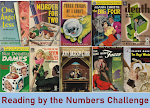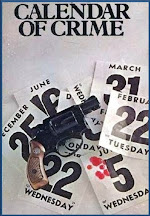 There are all sorts of reasons why The Anatomy of Ghosts by Andrew Taylor should have been a winner: it's a historical mystery; it's a historical mystery with academic ties; it started out so very promising and held that for about the first 100 pages. But then it just kind of lost me. And it isn't the first time that Taylor has done that to me--although I didn't realize it until after I had gotten all interested in the book (when I first heard about it last year) and put it down for a few challenges. Several years ago I picked up his book Caroline Miniscule which also had academic ties. I remember that it started out fine...only to lose steam about mid-way through. His Bleeding Heart Square is better than either of the other two.
There are all sorts of reasons why The Anatomy of Ghosts by Andrew Taylor should have been a winner: it's a historical mystery; it's a historical mystery with academic ties; it started out so very promising and held that for about the first 100 pages. But then it just kind of lost me. And it isn't the first time that Taylor has done that to me--although I didn't realize it until after I had gotten all interested in the book (when I first heard about it last year) and put it down for a few challenges. Several years ago I picked up his book Caroline Miniscule which also had academic ties. I remember that it started out fine...only to lose steam about mid-way through. His Bleeding Heart Square is better than either of the other two.But, back to the review....The story revolves around Frank Oldershaw, the only son of Lady Anne Oldershaw and a student at Jerusalem College, Cambridge. Frank has gotten himself mixed up with the Holy Ghost Club (read a hellfire club) and after some unpleasant experiences there, he begins seeing the ghost of the deceased wife of one of the College's members. He becomes quite violent and is tucked away in a madhouse as a result. Lady Anne Oldeshaw calls upon John Holdsworth to get to the bottom of what exactly has happened to her son and charges him with bringing the young man back to sanity. Holdsworth is no doctor and has no experience with mental disease--but that's not why she wants his help.
As the result of personal tragedy (the deaths of both his son and his wife), Holdsworth has written a book called The Anatomy of Ghosts--discrediting the idea of ghosts and the charlatans who claim to put the grieving in touch with them. Lady Oldershaw wants Holdsworth to prove to her son that ghosts don't exist and believes that this will be enough to return his reason to him. Holdworth finds that he must find out what really happened to Sylvia (the dead woman whose "ghost" was seen) before he can help Frank. But that is no easy task....and the answers may not be ones that either the College or Lady Oldershaw want to hear.
As I mentioned, this book started out promising enough. The stage was well-set and Taylor took me back to the 18th Century with very little effort. The historical details were terrific without being overwhelming. But after introducing the characters with very interesting scenes, he did not sustain the same sort of story-telling throughout. I hit the mid-way point and found that I didn't much care about these people or what really happened. I soldiered on just to find out who did it and why it affected Frank so much....but, honestly, if I hadn't needed the book for some challenges, I might not have finished. Two stars--for the promising beginning and the fine quotes I gathered.
Quotes:
Books are not luxuries. They are meat and drink for the mind. [Ned Farmer; p. 22]
The footman had conducted Holdsworth across the hall, through an anteroom and into a long and shabby apartment at the back of the house. The books were everywhere--in cases ranged along the walls, stacked on tables, and the floor, overflowing from the doorway of a closet at the end of the room. [p. 29]
He had seen the libraries of too many men, both living and dead, to be surprised by what they contained. A man's library was like his mind: some of its contents might not be suitable for young gentlemen at the University, or indeed for his grieving widow or his fatherless children. [p. 33]
Money was a powerful thing, Holdsworth thought, the true philosopher's stone, with the power of transmuting dreams. [p. 45]
"Money makes it very serious. Her ladyship has given you all this before you have lifted a finger for her. She will expect a return. The rich always do."
Holdsworth smiled at him. "That is why they are rich." [Ned Farmer; John Holdsworth; p. 46]
Ghosts, whether real or alleged, usually have an identity, and that is, in itself, of significance. [Elinor Carbury; p. 51]
EC: ...Jerusalem [College] is a world within a world. So is any college in this University, or perhaps at any university. A college is a world with its own laws and customs.
JH: It might be a world of savages for aught I know.
[Elinor Carbury; John Holdsworth; p. 59]
Horace's recipe advises only a dash of folly in one's wisdom, and Mr. Archdale appears to have mistaken the proportions in his moral cookery. [Mr. Richardson; p. 62]






































